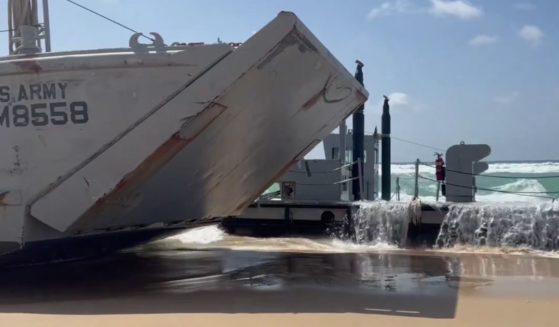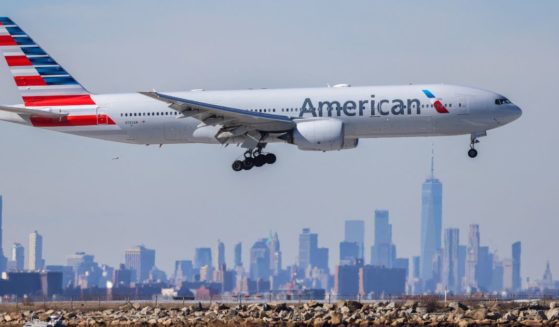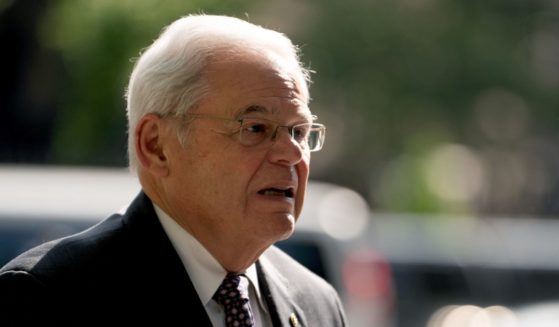Top Maine Republican Lucky to Be Alive After His Boat Capsized at Sea
Like most lobstermen, the Maine House Republican leader scrambled to complete his work ahead of the remnants of Hurricane Lee. Rep. Billy Bob Faulkingham was rushing home from sea when a giant wave rose up, seemingly from nowhere, and towered over his boat.
Moments later, he and fellow fishermen Alex Polk found themselves plunged into the cold North Atlantic as they witnessed a horrifying sight: The sturdy 40-foot (12-meter) vessel built for offshore fishing had flipped over, its propeller still turning and its diesel engine belching black smoke.
“This boat was turned upside down in a nanosecond like a bathtub toy,” Faulkingham recounted.
The National Oceanic and Atmospheric Administration and U.S. Coast Guard had warned mariners at noon Friday that they needed to immediately begin making plans to avoid the onrushing storm — just about when Faulkingham was turning to home at Winter Harbor, a few miles (kilometers) east of Mount Desert Island and Acadia National Park.
Suffering a black eye, facial fracture and stitched lip, Faulkingham counted Polk and himself lucky to be alive Monday. Polk broke an arm and the wrist on his other arm, and suffered a big gash on his face, Faulkingham said.
Their ordeal unfolded Friday afternoon as the water in the Gulf of Maine was already starting to churn. But it still wasn’t rough enough to prevent lobstermen from finishing their work.
Despite choppy waves of 5 to 8 feet (1.5 to 2 meters) offshore, Faulkingham said, seas were relatively calm. The two were watching waves crashing ashore on an island and just about to head toward harbor when the wave loomed large.
Faulkingham estimated the swell was possibly 40 feet (12 meters) high. With only about a second to react, he hit the throttle.
“It was surreal to see a wall of water coming at you like that. It’s just not natural to see water coming at you laterally. It was above us. I don’t know how high it was in total. But it was above us,” he said.
The next thing he knew, he was swimming away from the boat. Inside the overturned vessel, Polk gulped some air and pushed off with his good arm, emerging on the other side, Faulkingham said.
The boat’s engine was somehow still running, black smoke belching and propeller spinning.
Faulkingham climbed onto a flat part of the stern of the overturned boat and grabbed Polk with his good arm to help him to safety, as well. That’s when Faulkingham realized the force of the wave had pulled his shorts and sweatpants to his ankles. He used the sweatpants to stem the bleeding from Polk’s head.
They took off their oilskins and boots and awaited help. Faulkingham’s phone was gone. Faulkingham tied his oilskins, the waterproof gear worn by fishermen at sea, into a way that they could be used for emergency flotation. They pinned their hopes on being spotted or the Coast Guard being alerted by their emergency locator beacon, which is activated by exposure to water.
Several planes flew over and several other lobster boats passed in the distance, but no one saw them. In the meantime, the Coast Guard, responding to the beacon, alerted Faulkingham’s wife at 12:20 p.m. and the search was on.
Even though Polk was severely injured, Faulkingham said, he was safe and felt God was watching as flotsam and jetsam from his boat was pushed ashore. But his boat stayed put, and didn’t immediately sink. In fact, the sun beating down on the black hull warmed up, providing the men some comfort from the cold ocean water.
“I knew it was a bad situation but I had no fear. I can’t explain the science of adrenaline or any of that other stuff. All I know was it was the presence of God,” he told The Associated Press.
Their rescuer was a familiar fisherman. A cousin, Mikie Faulkingham, was the first to find them at 1:18 p.m. He hauled them onto his lobster boat and rushed to shore, where an ambulance took them to the hospital.
Their boat sank.
Their ordeal had begun just as the Coast Guard was telling mariners to rush final preparations for Lee, still a Category 1 hurricane more than 400 miles (640 kilometers) to the south. The National Weather Service sent out an advisory with a call to action, alerting mariners in bold letters that they “must be executing avoidance plans now.”
Some, like Faulkingham, were just finishing their haul of lobster. Others were pulling traps out of the water, or taking them to safer waters farther offshore.
The Coast Guard can’t stop mariners from going out in severe weather, but did its best to arm them with information to take the storm seriously, Petty Officer Diolanda Caballero said.
“We put out these advisories to make sure people are safe and trying their best. We said multiple times the ocean is unforgiving. We can’t really stop people from going out — it’s ultimately at their own risk,” Caballero said.
Faulkingham, 44, is on recess from Maine’s part-time Legislature until it begins its next session early next year. He was elected to the Legislature in 2018 and has worked in lobster fishing his entire life.
He said Monday he felt like he’d been run over by a truck. Still, the close call won’t stop him from heading back to sea.
“Fishing is who I am. It’s what I do. It’s my livelihood. It’s how I feed my family. It’s what I love,” he said.
The Western Journal has reviewed this Associated Press story and may have altered it prior to publication to ensure that it meets our editorial standards.
Truth and Accuracy
We are committed to truth and accuracy in all of our journalism. Read our editorial standards.












